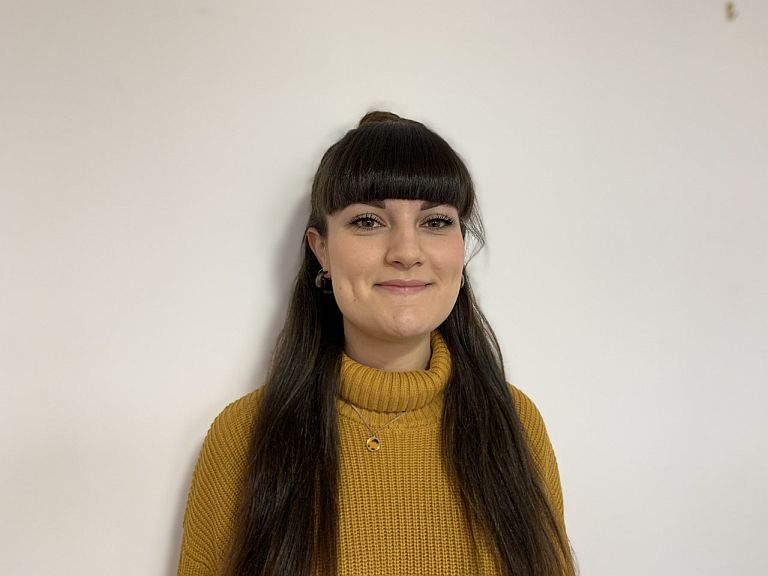Karenza’s Story: A Day in the Life Of… Mental Health Practitioner… Part 2!
08/10/2020

“This was (and still is) a worrying and confusing time for many young people, so I was keen to do what I could to continue supporting students as best as possible.”
As it did for many other people, Covid-19 changed the way I worked here at Manchester Mind Children and Young People’s Service in ways I would never have anticipated. As a Mental Health Practitioner working face-to-face with many students across four schools every week, when schools closed in March, I was suddenly presented with the challenge of re-shaping my way of working in order to safely continue providing support to students.
This was (and still is) a worrying and confusing time for many young people, so I was keen to do what I could to continue supporting students as best as possible. Fortunately, after a small adjustment period, I was able to revamp the small kitchen table in my flat into something loosely resembling an office space, adjust to the rhythm of working from home, and continue my work with students remotely. My typical working day would normally look something like this:
7:00am: Wake up. Well, sort of. I have got into the habit of turning off my alarm and either embarking on some bleary-eyed skim reading of the news (a decision I inevitably always regret given the not-so-cheery state of current affairs) or merrily snoozing my way through another couple of alarms.
7:30am: Actually wake up, get out of bed and get ready for the day. I put on my comfiest trousers but a smart-ish top – a new smart-casual look for 2020 which I believe is called ‘Zoom chic’.
8:20am: Pop on a podcast and go for a half-hour walk. I live in a busy, built-up part of Manchester, however getting some exercise and (sort of) fresh air always sets me up for the day ahead.
9am: My working day starts. Our team has a ‘check-in’ each morning where we share our work focuses for the day. Occasionally we drift off-focus onto topics such as our TV recommendations or lockdown baking accomplishments, but I enjoy this non-work-related chat as well – it’s something I miss now I’m working from home.
“we discuss the importance of making time every day to do things that make him feel happy.”
10am: My first student call today is with Student A. He’s been struggling with the absence of his regular school-day routine since his school closed. He tells me this week he has gone to bed around 5am each night, woken up in the afternoon, and had no motivation to do any school work in between. Being off school is making him feel sad but also irritable with his family, which he feels bad about. Together on the call, we devise some small changes Student A could make to his week that might improve his mood. Alongside improving his routines around sleep and school work, we discuss the importance of making time every day to do things that make him feel happy. Student A tells me he likes cycling, and decides he will try going on a short bike ride each day this week. I look forward to hearing how he gets on next week.
“Student B asks me when things will go back to normal; I can tell she is feeling overwhelmed.”
11am: My next call is with Student B who has learning difficulties. She is feeling very anxious about Covid-19, in particular the introduction of new rules and restrictions in places which were familiar and part of her weekly routine, like the supermarket. Student B also finds the disruption to her school-day routine distressing; she tells me she misses her teachers and struggles to study at home with her younger siblings around, as it often gets noisy. Student B asks me when things will go back to normal; I can tell she is feeling overwhelmed. I tell her that I don’t know the answer to her question yet, but suggest that until we both do, we try and find some ways to make her current circumstances more comfortable and manageable. We spend the rest of the call brainstorming ideas for how to reduce her anxiety, which we will then share with other relevant adults in her life to help her feel supported and safe.
12pm: Lunchtime. I’ve enjoyed lunchtime whilst working from home, as I can make my lunches fresh, instead of having to have whatever will survive in my bag the longest (normally a sandwich) whilst working in schools. My partner leaves his office (the spare room) and joins me in my office (the kitchen table), where we then head to our staff canteen (the sofa) to eat and chat about how our days are going so far. After this, it’s back to work in our respective offices before my next call.
“we discussed ways that Student C could still socially connect in enjoyable ways with his friends, even whilst physically shielding.”
1pm: Student C has a long-term physical health condition which worsened last year. He was off school for months prior to Covid-19 and, just as he was beginning a slow transition back into his school, his school was forced to close due to Covid-19. Student C misses his school friends a lot; he feels isolated but also deeply frustrated with his current circumstances, as due to his physical health, he has to shield from Covid-19 and isolate himself further. This week we discussed ways that Student C could still socially connect in enjoyable ways with his friends, even whilst physically shielding. Student C enjoys watching films, football and drawing. In light of these interests, some of our ideas for social activities included throwing a Netflix watch-a-long party, playing FIFA, and playing Pictionary or another drawing game on a video call or app. Student C liked these ideas and said he would try at least one this week.
“(she) feels stressed and anxious about falling behind at school.”
2pm: On my next call, Student D tells me she’s finding it difficult to complete her school work at home. There is only one computer in the house and her three other school-aged siblings also need to use it for their full timetables of school work. Student D wakes up early every morning before her siblings wake up to do school work, however she does not have the time on this shared device to complete it all, so feels stressed and anxious about falling behind at school. I run though some options with Student D, reassuring her that we will find a solution which will hopefully help reduce her stress. I also tell her she has inspiring levels of motivation for her school work which she should be proud of. After the call, I contact a member of staff in Student D’s school; they inform me that the school now has a laptop loan scheme for students who need one and can drop a laptop off at Student D’s house tomorrow – good news!
“We discuss other meaningful ways of saying goodbye when someone you love dies.”
3pm: My final call of the day is with Student E. She is experiencing a bereavement; a family member has recently died from Covid-19. She tells me she could not attend the funeral this week due to restrictions on the number of guests, which she was sad about. We discuss other meaningful ways of saying goodbye when someone you love dies. Student E decides she would like to write a goodbye letter to this relative, but would also like to plant some flowers in their memory in the back garden. Student E goes on to tell me how she is emotionally supporting her younger siblings who are worried that more of their family members will die from the virus; I am moved by Student E’s resilience in these difficult circumstances. When I ask Student E what she has been doing to help herself cope during this difficult time, she replies, “writing, basketball, and lots of baking”. We end our call vouching for the eternal healing power of a freshly baked chocolate chip cookie.
4pm: My colleagues and I who provide calls to students or calls as part of our Listening Ear Service, run a ‘check-out’ every afternoon to share any concerns and make sure we’re all doing okay. Sometimes working from home can feel quite lonely, so I am grateful for this time with colleagues to debrief. Afterwards, I quickly catch up with staff at the students’ schools to let them know how calls that day have gone.
4:30pm: Work = complete (for today anyway). At times, I still find working within the realms of this ‘new normal’ hard. However, on those more difficult days, I find comfort in the knowledge that despite these uncertain times, I am still able to continue playing my small part in providing some stability and support to young people who need it the most.
